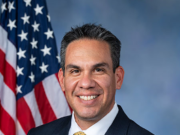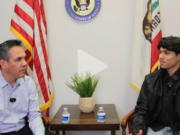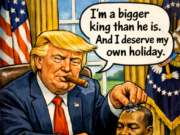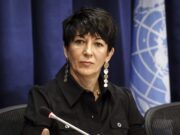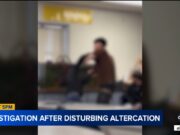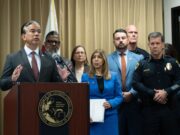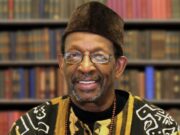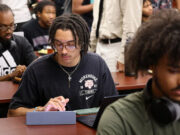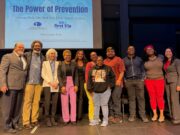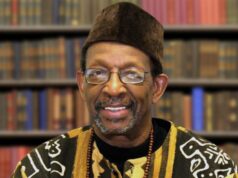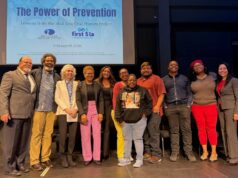By Edward Henderson | California Black Media
The mass immigration raids across Los Angeles County last month were the spark for protests and demonstrations across the region. The area is home to the second-most undocumented migrants in the country and thousands of demonstrators filled the streets outside of the federal building in downtown Los Angeles to condemn the actions of the Trump administration and U.S. Immigration and Customs Enforcement (ICE).
In response to the demonstrations, local police doused protesters with tear gas and flash-bang grenades. When protesters hurled projectiles and fireworks back at police and their vehicles, President Donald Trump deployed over 4,000 National Guard troops and 700 Marines to the city. Images and video depicting the more aggressive response from reinforcements prompted an online debate over whether or not Black Americans should sit these protests out. The viral criticism was swift, and some responding with the argument that immigration enforcement wasn’t a “Black issue.”
On social media, one user wrote, “Black people be warned. Go home. This is not your battle to fight.” The comment, which focused on the threat of violence against protestors, was shared thousands of times across social media and eventually amassed millions of views.
Lurie Daniel Favors, activist, attorney and author, echoed these sentiments on a YouTube Live which drew 25,000 viewers shortly after Trump’s reinforcements came in.
“We have said as Black people, we’re not going to these protests because we know that these anti-Trump protests are going to be safe until Black people show up. You bring out the tanks, you bring out the tear gas, you bring out the ammunition which you don’t typically use against White people,” Favors said.
Despite the threat of physical harm at these demonstrations, it has not stopped some Black American activists and allies from showing their support. Shelley Bruce, an artist, activist and founder of The Heart Department, has been outspoken about her belief that the mass deportations and actions of ICE are an issue Black Americans need to be concerned about.
“I’m a Black American woman, but my mom is an immigrant who became a citizen from Jamaica. This entire issue has detained and arrested not only immigrants from across many diasporas, but also racially profiled people who look like they’re immigrants. Black people have always been racially profiled, as shown by our police departments for decades. There have been Mexican American citizens who have been detained, if not deported. It’s a racial profiling issue,” Bruce said.
Venezuelan immigrant Elias Antunez, a key contributor to an immigrant rights organization, spoke with California Black Media about his views on the issue and why support from the African American community inspires him.
“It’s a very powerful reminder of what the United States of America could be — and what democracy in action actually looks like. I think immigration is a Black issue. Two of the biggest groups that they’re going after — Venezuelans and Haitians — are diasporic people. Unquestionably Black folk.”
There are over 4 million Black immigrants living in the U.S., which is about 10% of the nation’s Black population, and California has the sixth-most Black immigrants in the country, with about 60,000 Black immigrants living in Los Angeles.
“I think that the Black community in particular—throughout the United States, even just thinking about L.A. — have been coming out and supporting. African American folks have consistently held the moral compass of justice in this country,” Antunez said.
Despite her support of protesting against anti-immigration actions, Bruce understands why some Black Americans are feeling hesitant to jump in.
“Black folks are exhausted. We get the worst brunt of all racism and discrimination in the United States. It’s understandable that we feel tired and we feel like, ‘Y’all do it.’ But I will say this: I am understandably tired. But I intentionally choose what I do. Many of us find other ways to do movement work. I respect Black rest. I respect Black investment.”
In Sacramento and across California, Black elected officials – including several members of the California Legislative Black Caucus (CLBC) – have stood with immigrant communities and pushed back against the aggressive tactics and indiscriminate arrests carried out by federal agents.
“There are three things you should know about the California ICE raids” CLBC vice chair Isaac Bryan (D-Ladera Heights) posted on his Bluesky social media account on July 11.
“Number one: The City of Los Angeles is expected to pay over $30 million cleaning up the mess created by the Trump administration marching through our streets. It’s money that could have gone to the L.A. Wildfire victims who are still waiting for their federal disaster aid,” said Bryan in a video.
He continued, “California is expected to lose over $275 billion in economic activity because of these ICE raids.”
“Number three,” Bryan concluded, “17 states plus the city of L.A., the County of Los Angeles and jurisdictions across the country sued the Trump administration this week. We are trying to put an end to the racial profiling. We’re trying to put an end to folks being detained without a lawyer. We’re trying to put an end to the warrantless arrests.”
Bryan emphasized that citizens have the right to observe police actions and to document it.
“Continue to protest,” Bryan encouraged Californians. Be heard. Support communities who have been most impacted. And remember, nothing melts ICE faster than solidarity.”
For those on the fence about knowing when to join demonstrations, the Malcolm X Grassroots Movement, a human rights organization, released a checklist on how to assess action when it comes to protesting an issue and questions you may need to ask to ensure your safety. Key questions include:
Are you familiar with the organizations organizing the protest?
- Are these organizations trusted by the community, and what are their demands?
- Are the actions and routes of the protest planned out?
- Is their jail and legal support?
- Will there be police liaisons, and security or safety marshals?



